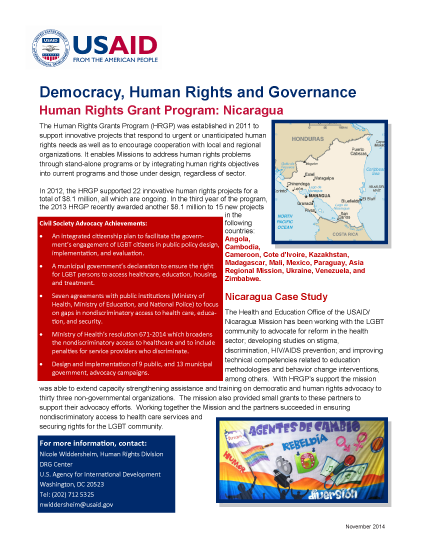Democracy, Human Rights and Governance
The Human Rights Grants Program (HRGP) was established in 2011 to support innovative projects that respond to urgent or unanticipated human rights needs as well as to encourage cooperation with local and regional organizations. It enables Missions to address human rights problems through stand-alone programs or by integrating human rights objectives into current programs and those under design, regardless of sector.
Human Rights Grant Program: Nicaragua ![]() (pdf - 580k)
(pdf - 580k)
In 2012, the HRGP supported 22 innovative human rights projects for a total of $8.1 million, all which are ongoing. In the third year of the program, the 2013 HRGP recently awarded another $8.1 million to 15 new projects in the following countries: Angola, Cambodia, Cameroon, Cote d'Ivoire, Kazakhstan, Madagascar, Mali, Mexico, Paraguay, Asia Regional Mission, Ukraine, Venezuela, and Zimbabwe.
Nicaragua Case Study
The Health and Education Office of the USAID/Nicaragua Mission has been working with the LGBT community to advocate for reform in the health sector; developing studies on stigma, discrimination, HIV/AIDS prevention; and improving technical competencies related to education methodologies and behavior change interventions, among others. With HRGP’s support the mission was able to extend capacity strengthening assistance and training on democratic and human rights advocacy to thirty three non-governmental organizations. The mission also provided small grants to these partners to support their advocacy efforts. Working together the Mission and the partners succeeded in ensuring nondiscriminatory access to health care services and securing rights for the LGBT community.
Civil Society Advocacy Achievements:
- An integrated citizenship plan to facilitate the government’s engagement of LGBT citizens in public policy design, implementation, and evaluation.
- A municipal government’s declaration to ensure the right for LGBT persons to access healthcare, education, housing, and treatment.
- Seven agreements with public institutions (Ministry of Health, Ministry of Education, and National Police) to focus on gaps in nondiscriminatory access to health care, educa-tion, and security.
- Ministry of Health’s resolution 671-2014 which broadens the nondiscriminatory access to healthcare and to include penalties for service providers who discriminate.
- Design and implementation of 9 public, and 13 municipal government, advocacy campaigns.








Comment
Make a general inquiry or suggest an improvement.